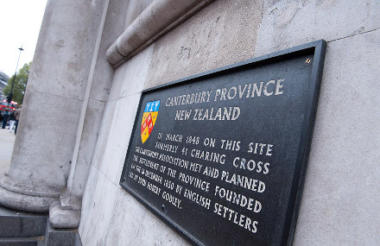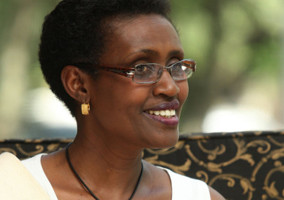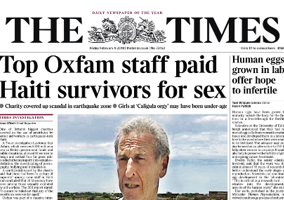The way the crisis around Oxfam has developed over the last ten days is odd, frankly. There are some very serious allegations out there, but they're being ignored in favour of a seven-year-old story.
I feel that at one level The Times has done us a favour. It’s highlighted that there's clearly a massive problem in the world of aid. This isn't wholly surprising. Aid is a weird, dysfunctional world, full of single men, a continent away from their home societies and support mechanisms, doing difficult jobs, in an environment where all social structures have been upended, rife with power imbalances and latent criminality.
Reading the words written by women who work in aid, and the statistics gathered by experts, it looks to me - an outsider and non-expert - as if aid has a crisis of sexual misconduct on its hands. It looks as if safeguarding in the whole sector needs to be completely revamped. If The Times makes that happen, I think the good it's done will outweigh the harm, and I think it's time for the sector to roll up its sleeves and get started.
But that doesn't take away from the fact that the actual story that we've been discussing for ten days is, to be honest, not that strong.
What actually happened?
Essentially seven years ago, under different leadership, Oxfam proactively detected misconduct by seven individuals out of 5,000 staff and promptly removed the people responsible. It carried out a thorough investigation, informed the Charity Commission and DFID, and put out two press releases. Then it revamped its safeguarding, now widely regarded as the best in the business.
So what did it do wrong? It didn't go out of its way to make sure the individuals involved never worked again, it never informed the utterly ineffectual Haitian police, and - and this seems to be the most damning accusation - it never mentioned the word sex anywhere in public.
None of this is the crime of the century.
There have been other accusations. Some serious allegations about charity shops surfaced and seem, after an initial flurry of public outrage, to have been largely ignored. Misconduct has been uncovered in other countries. But the root of the issue is still this seven-year-old use of prostitutes.
As a result of that single incident, at least three inquiries have been launched, corporates and celebrities are rushing around issuing statements, and the UK government is apparently suspending all funding.
Meanwhile many other charities have come out and said they have sacked people for sexual misconduct, but no one seems to have batted an eyelid.
I say again. This is a big story. The Times has shown there is a major problem. But the problem we're talking about on the front pages is not the issue we need to address.
The majority of the stories of the last week and a half have involved people reacting to other people, reacting to the original story.
It feels as if Oxfam is being unfairly singled out.
Why is the story running?
Essentially, stories only work if they speak to something people already want to read. It's clear that the public - at least the right-leaning public - were already primed to see Oxfam humbled.
I think Oxfam has the same problem that all charities have – it is expected to operate to a higher ethical standard than others. This is magnified because it works in aid, which is viewed with intense suspicion by much of the public, and magnified again by the campaigning stance it has taken, which is seen as anti-capitalist. And it has become a victim of the power of its brand, which dwarfs that of any other aid organisation.
Oxfam has painted itself as whiter than white, essentially, and so a public moral failure becomes an absolute disaster. Especially since it is about sexual exploitation, which in the year of #MeToo is a lodestone for condemnation.
It is this which has led Mark Goldring to wonder in the Guardian, with some justification, why everyone is getting quite so upset.
I feel as if Oxfam has made a mistake in its campaigning and work with the press. It’s tried to be humble but become arrogant.
I can see why. Its leaders see gross injustice in the world, and feel this isn't a society they want to live in. They want to force people to see what they see.
For what it’s worth, I agree with them. But I don't know if the charity's attempts to communicate its message have been persuasive. Its method - at least, how I've perceived it - is to try and ram inequality as far as possible down the throats of the public and our politicians, until they choke on it. But a £400m organisation, led by a man earning £130,000 a year, has to be very careful when discussing poverty, and I’m not sure Oxfam has shown due care.
It's costing them now.
Are you so sorry?
Oxfam also has a communications problem. Its approach to the current problem has been to say sorry a lot. It's hard to do otherwise with the media baying for your blood. But Oxfam staff aren’t sorry. They don’t really believe they did much wrong. They're proud of their charity and what they've achieved. They believe they have good procedures, and that any mistakes are in the distant past. The We Are So Sorry adverts at the weekend are just Oxfam saying anything it can think of to make the problem go away. Mark Goldring doesn't think he needs to resign. He's apologising but it's not desperately clear what he's apologising for.
His problem is that the media has whipped itself into a tizzy.
Let’s move on
The thing is, Mark Goldring doesn’t deserve to resign. He's a good CEO reacting to problems which were dealt with before he joined.
It’s obvious he wants to come out swinging. I wonder if he wants to go before MPs tomorrow and throw the rest of the sector right under the bus.
I don't think he will. I think he's going in as a sacrificial lamb, to be shouted at by MPs for two hours so the UK parliamentary system can show it is taking this seriously.
I for one have had enough. This is now a witch hunt against Oxfam. There's a really big, serious story which is being drowned out in all the hysteria.
It's time to stop talking about one incident at Oxfam, and start talking about all the many things that are wrong in the world of aid.
Because there is a big issue here. It’s not just happening in Haiti. Safeguarding is a dry, boring word but it’s a crucial issue of our sector – and not just our sector, either. There are widespread failures, and they need to be exposed, to make it as unlikely as possible that they ever happen again.
|
Related articles












